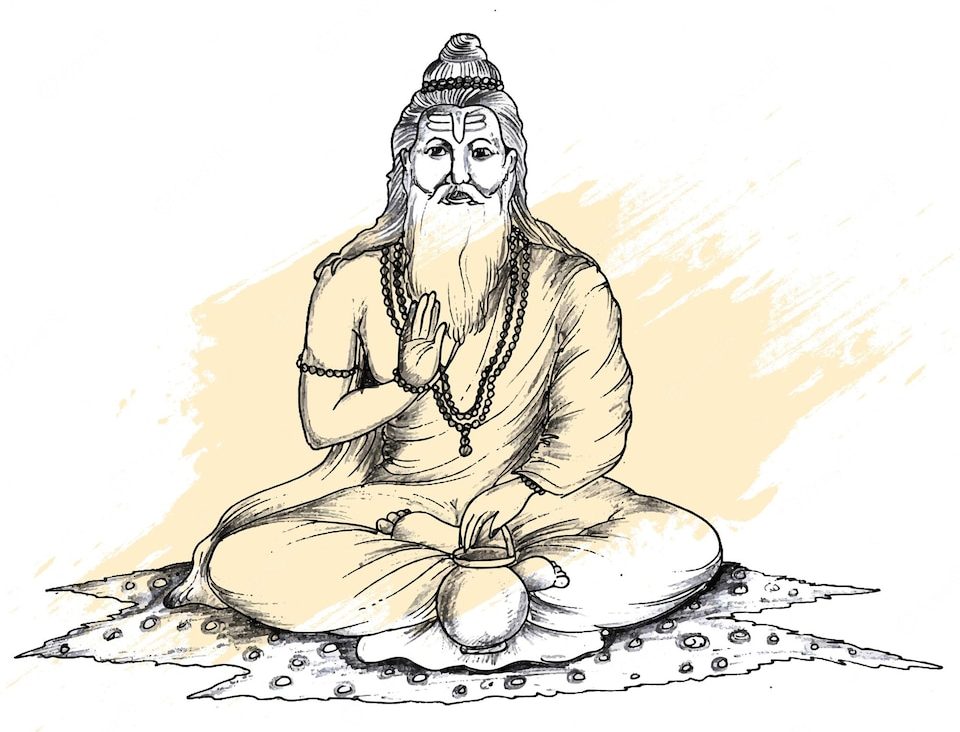
Maharshi Kanada
The Father of Indian Atomism
Introduction:
Maharshi Kanada, also known as Kanada or Uluka, was a great Indian philosopher and scientist who lived in the 6th or 7th century BCE. He is best known for his theory of atoms, which he described in his book, the Vaisheshika Sutras.
Kanada’s theory of atoms was based on his observations of the natural world. He noticed that matter could be divided into smaller and smaller pieces, but that there was a point at which it could not be divided any further. He called these smallest particles atoms, from the Sanskrit word anu, meaning extremely small.
Kanada believed that atoms were eternal and indestructible. He also believed that they had different properties, such as size, shape, weight, and color. These properties were what gave matter its different characteristics.
Kanada’s theory of atoms was a major contribution to science. It was the first systematic theory of matter, and it laid the foundation for modern chemistry and physics.
Kanada’s Life and Work
Kanada was born in the city of Ujjain, in what is now the state of Madhya Pradesh, India. He was the son of a philosopher named Ulūka. Kanada studied under his father and other great philosophers of his time.
Kanada was a prolific writer. He wrote several books on philosophy, science, and religion. His most famous work is the Vaisheshika Sutras, which is a collection of 100 aphorisms on the nature of reality.
The Vaisheshika Sutras is one of the most important texts in Indian philosophy. It is the foundation of the Vaisheshika school of thought, which is one of the six orthodox schools of Hindu philosophy.
Kanada’s work had a profound impact on Indian thought. His theory of atoms was adopted by other philosophers and scientists, and it was used to explain a wide range of phenomena.
Kanada’s work is still studied today by scholars and scientists around the world. He is considered one of the greatest philosophers and scientists of all time.
Kanada’s Legacy
Kanada’s legacy is immense. He was a brilliant philosopher and scientist who made major contributions to the fields of chemistry, physics, and philosophy. His work is still studied today by scholars and scientists around the world.
Kanada’s most famous contribution was his theory of atoms. He was the first person to propose that matter was made up of tiny, indivisible particles. This theory was revolutionary at the time, and it laid the foundation for modern chemistry and physics.
Kanada was also a great thinker on other subjects, such as logic, metaphysics, and ethics. His work has had a profound impact on Indian thought, and it is still studied today by scholars and philosophers around the world.
Kanada was a true genius, and he left a lasting legacy on the world. He is a role model for all scientists and philosophers, and his work will continue to inspire and inform for generations to come.
Contributions to Science
Kanada’s theory of atoms was a major contribution to science. It was the first systematic theory of matter, and it laid the foundation for modern chemistry and physics.
Kanada’s theory of atoms was based on his observations of the natural world. He noticed that matter could be divided into smaller and smaller pieces, but that there was a point at which it could not be divided any further. He called these smallest particles atoms, from the Sanskrit word anu, meaning extremely small.
Kanada believed that atoms were eternal and indestructible. He also believed that they had different properties, such as size, shape, weight, and color. These properties were what gave matter its different characteristics.
Kanada’s theory of atoms was revolutionary at the time. It was the first time that anyone had proposed that matter was made up of tiny, indivisible particles. This theory was later adopted by other philosophers and scientists, and it is now the foundation of modern chemistry and physics.
Conclusion:
Maharshi Kanada was a brilliant philosopher and scientist who made major contributions to the fields of chemistry, physics, and philosophy. His work is still studied today by scholars and scientists around the world. He is considered one of the greatest philosophers and scientists of all time.
Editor – Kaalchakra Team
[ Note – Before Concluding anything as a Finale, Please Go through Original Scriptures of Vaidik Literature Written in Sanskrit and Also with Meaning of That time of Language. Because English is a Limited language to Explaining the Deeper Knowledge of Vaidik Kaal. ]
